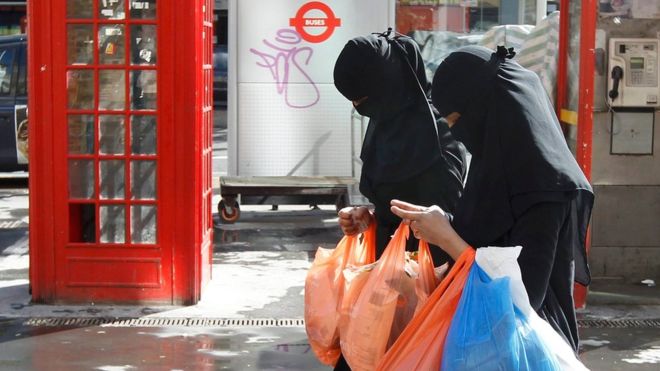
More than 100 Muslim women have complained about their treatment under two government probes into Sharia law. The inquiries, one ordered by the then Home Secretary Theresa May and another by the home affairs select committee, are ongoing.
But some women have signed an open letter and said the aim was to ban Sharia councils, not reform them. The Muslim Women’s Network UK said the inquiries risked treating women like “political footballs”. The councils are tribunals often used to settle disputes within the Muslim community.
However, the Home Office said its inquiry’s chair, panel and advisers were “carefully selected and represent a wide range of relevant experience and expertise”.
The chair of Muslim Women’s Network UK, Shaista Gohir, said the inquiries could patronise women, “everyone wants to listen to Muslim women when highlighting their terrible experiences. However when it comes to the solutions, everyone thinks they know what is best for them. I do feel that there are people who are anti-faith, particularly anti-Islam, who are using women’s rights as a guise, wanting to abolish Sharia councils. If tomorrow or next year you shut down Sharia councils, what would result is Muslim women stuck in marriages, abusive marriages sometimes, and the Sharia divorce service would actually go underground. That would result in less transparency, higher prices and more discrimination.”
However, longstanding critic of Sharia councils crossbench peer Lady Cox, says women are “suffering” under the system and she has repeatedly tried to get legislation through Parliament to reform the councils. Lady Cox said, “So many Muslim women come to me and tell me how desperately unhappy they are. One lady came to me last week and had gone almost suicidal with the provisions of a Sharia council. So we need to look at the whole system and the way it operates.”
Lady Cox rejected as “absolute rubbish” the suggestion that critics were using the position of women in Islam to attack Sharia councils. “A lot of the women who support me are Muslim women, who don’t have a voice. Some of the strongest support for what I’m advocating comes from Muslim women themselves.”
A Home Office spokesman said, “this government commissioned an independent review of the application of Sharia law as there is evidence some Sharia councils may be working in a discriminatory and unacceptable way.” He added that the review’s chair, panel and advisers “bring strong academic knowledge, legal insight and credible expertise in religion and theology”.
Labour MP Naz Shah, who sits on the Home Affairs Committee, said the councils could never be a replacement for the civil courts, “Sharia itself is a code of conduct and the fundamental principle of Sharia is that the law of the land precedes anything, it takes precedence. You cannot enforce and have a second paralegal system in this country. As a British law-maker, I am very clear we have one law and that law is that of the British court. The Sharia is there to support women and communities to things that they want to access and that’s a choice for them. There’s lots of issues with Sharia councils – usually they are under-resourced, there’s not that professional standard – what we need to be doing is supporting the Sharia councils. Sharia councils are sometimes last resorts where people who have lost legal aid; we’ve had austerity kicking in and the courts don’t want to deal with small disputes, so they can act as a complementary arbitration service. But what we need to be careful of is whether they are discriminating against women and that is where the issue lies.”
What are Sharia councils?
Sharia councils are tribunals that seek to apply Islamic laws to everything from financial disputes to marital conflicts. They are unregulated and largely unknown to the wider public.
The precise number of these councils in the UK is not clear though research suggest there are about 30.





Be the first to comment